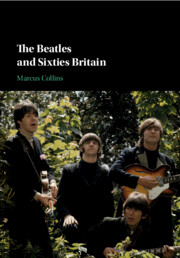Book contents
- The Beatles and Sixties Britain
- The Beatles and Sixties Britain
- Copyright page
- Contents
- Figures
- Tables
- Preface: Imagining the Beatles
- Introduction
- 1 The Other Sixties: An Anti-Permissive Permissive Society?
- 2 Society, 1963–1965: The Beatles and Modernity
- 3 Society, 1966–1970: The Beatles Go Too Far
- 4 Culture: The Beatles as Artists
- 5 Politics: The Beatles, Parliament and Revolution
- Conclusion
- Notes
- Bibliography
- Index
5 - Politics: The Beatles, Parliament and Revolution
Published online by Cambridge University Press: 11 March 2020
- The Beatles and Sixties Britain
- The Beatles and Sixties Britain
- Copyright page
- Contents
- Figures
- Tables
- Preface: Imagining the Beatles
- Introduction
- 1 The Other Sixties: An Anti-Permissive Permissive Society?
- 2 Society, 1963–1965: The Beatles and Modernity
- 3 Society, 1966–1970: The Beatles Go Too Far
- 4 Culture: The Beatles as Artists
- 5 Politics: The Beatles, Parliament and Revolution
- Conclusion
- Notes
- Bibliography
- Index
Summary
This chapter examines how the unprecedented popularity and symbolic power of the Beatles forced politicians in Britain to attend to popular music in the 1960s. It begins by showing that parliamentarians were ill-equipped to comprehend not only the Beatles but also the new social forces with which they were associated. They reacted with a mixture of jocularity, partisan point-scoring and earnest debates over art, class, youth and the state. Their general bewilderment testified to how social and cultural change in sixties Britain exceeded the limits of the knowable and actionable in Westminster. The revolutionary left displayed more interest in and understanding of the Beatles than did Westminster politicians owing to the band members' class origins, youth appeal, anti-authoritarianism and support of certain radical causes. More broadly, left-wing writers and publications were instrumental in establishing pop music as a legitimate subject of analysis. Yet irrespective of their affiliations, most Marxists and anarchists adjudged the Beatles to be politically unsound. This was a correct analysis within its own terms, but testified to the difficulties encountered by revolutionary left organisations in accommodating countercultural values and attracting mass support among the young.
Keywords
- Type
- Chapter
- Information
- The Beatles and Sixties Britain , pp. 151 - 192Publisher: Cambridge University PressPrint publication year: 2020

